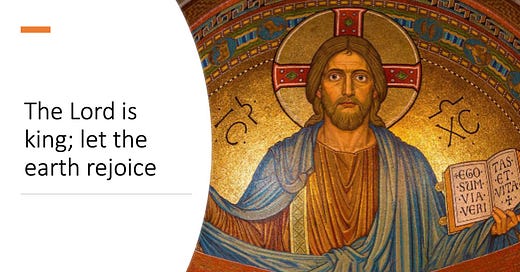Psalm 97:1 and 2b, 5-6, 10, 11-12
Psalm 97 begins with a proclamation that “the Lord reigns” and it is a cause for rejoicing: “Let the earth rejoice; let the many isles be glad” (Ps 97:1). But, the question arises: what does the psalmist mean by this declaration? Does he have in mind theocracy, spiritual kingship of God, or His divine providence?
In ancient Israel, we see the separation of power of the kings and the priests. Moses, their first leader, held both powers, but his successor Joshua was only anointed as a leader of the nation whereas religious power resided with the line of Aaron (see Num. 27:12-23). When the Davidic kingdom was destroyed by the Babylonians, only the priesthood remained. And after the destruction of the temple in 70 AD by the Romans, even the priestly line of Aaron vanished.
The proclamation that “the Lord reigns” appeared in the most turbulent times in the history of Israel. When their leaders failed them, the prophet Ezekiel spoke about times when God would be their shepherd (see Ezek. 34). And when the foreign nations oppressed them, the book of Daniel began to speak about an everlasting kingdom that would replace all other kingdoms (see Daniel 2:44; 7:14).
During the time of Jesus, the idea of God’s rule was extremely popular, but its understanding differed. Some expected a political kingdom resembling the one of David and Salomon. Among them were those who thought that God needed help in establishing this kingdom, and so they fought with the Romans. Another group despaired of the present world that was beyond redemption. It had to be destroyed before something new could come out. They withdrew from the affairs of this world and expected a future kingdom in the form of a new heaven and earth. Still others believed that God’s reign could come into this present world through faithful obedience to God's will. Thus, the coming of God’s rule depended on Israel's proper attitudes of repentance and good actions.
Jesus’ message began with the statement: “The time is fulfilled, and the kingdom of God is at hand” (Mark 1:15). Through his ministry, Jesus made people experience the presence of the kingdom of God, demonstrating that it was already active and among them. But, at the same time, he taught them to pray for the coming of God’s reign: “Your kingdom come" (Matt 6:10). Thus, in Jesus’ teaching and ministry, God’s reign had present and future aspects.
Perhaps, in present-day reality, the declaration that "the Lord reigns" in Psalm 97 does not excite us so much. And yet, the idea of God's spiritual kingship and His divine providence can serve as a source of solace and encouragement in our turbulent times. When God reigns in the hearts of the people, societies experience profound positive changes.




